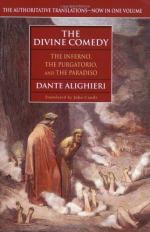Again drew near my side the very same,
Who had erewhile besought me, and their looks
Mark’d eagerness to listen. I, who twice
Their will had noted, spake: “O spirits
secure,
Whene’er the time may be, of peaceful end!
My limbs, nor crude, nor in mature old age,
Have I left yonder: here they bear me, fed
With blood, and sinew-strung. That I no more
May live in blindness, hence I tend aloft.
There is a dame on high, who wind for us
This grace, by which my mortal through your realm
I bear. But may your utmost wish soon meet
Such full fruition, that the orb of heaven,
Fullest of love, and of most ample space,
Receive you, as ye tell (upon my page
Henceforth to stand recorded) who ye are,
And what this multitude, that at your backs
Have past behind us.” As one, mountain-bred,
Rugged and clownish, if some city’s walls
He chance to enter, round him stares agape,
Confounded and struck dumb; e’en such appear’d
Each spirit. But when rid of that amaze,
(Not long the inmate of a noble heart)
He, who before had question’d, thus resum’d:
“O blessed, who, for death preparing, tak’st
Experience of our limits, in thy bark!
Their crime, who not with us proceed, was that,
For which, as he did triumph, Caesar heard
The snout of ‘queen,’ to taunt him.
Hence their cry
Of ‘Sodom,’ as they parted, to rebuke
Themselves, and aid the burning by their shame.
Our sinning was Hermaphrodite: but we,
Because the law of human kind we broke,
Following like beasts our vile concupiscence,
Hence parting from them, to our own disgrace
Record the name of her, by whom the beast
In bestial tire was acted. Now our deeds
Thou know’st, and how we sinn’d.
If thou by name
Wouldst haply know us, time permits not now
To tell so much, nor can I. Of myself
Learn what thou wishest. Guinicelli I,
Who having truly sorrow’d ere my last,
Already cleanse me.” With such pious joy,
As the two sons upon their mother gaz’d
From sad Lycurgus rescu’d, such my joy
(Save that I more represt it) when I heard
From his own lips the name of him pronounc’d,
Who was a father to me, and to those
My betters, who have ever us’d the sweet
And pleasant rhymes of love. So nought I heard
Nor spake, but long time thoughtfully I went,
Gazing on him; and, only for the fire,
Approach’d not nearer. When my eyes were
fed
By looking on him, with such solemn pledge,
As forces credence, I devoted me
Unto his service wholly. In reply
He thus bespake me: “What from thee I hear
Is grav’d so deeply on my mind, the waves
Of Lethe shall not wash it off, nor make
A whit less lively. But as now thy oath
Has seal’d the truth, declare what cause impels
That love, which both thy looks and speech bewray.”
“Those dulcet lays,” I answer’d,
“which, as long
As of our tongue the beauty does not fade,
Shall make us love the very ink that trac’d
them.”




